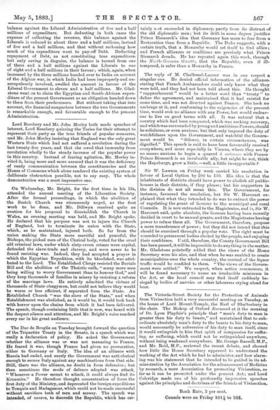The reply of M. Challemel-Lacour was in one respect a
singular one. He denied official information of the alliance, stating that French Ambassadors could only know what they were told, and they had not been told about this. He thought " rapprochement " would be a better word than " treaty " to define the agreement, and maintained that it had existed for some time, and was not directed against France. She took no umbrage at it, and conforming to the exigencies of the present time, would seek no alliance with any Power, but would endeav- our to live on good terms with all. It was natural that a country which had been conquered, which was seeking recovery, and which was surrounded by young and ambitious Powers, should be solicitous, or even anxious; but that only imposed the duty of watchfulness upon the Government, and watchful the Govern- ment would be. "Silence, in certain circumstances, was dignified." This speech is said to have been favourably received everywhere, and more especially in Vienna, where they are by no means anxious to begin a quarrel et outrance with France Prince Bismarck is an invaluable ally, but might be not, think the Hapsburgs, grow a little,—well, a little insupportable P


































 Previous page
Previous page